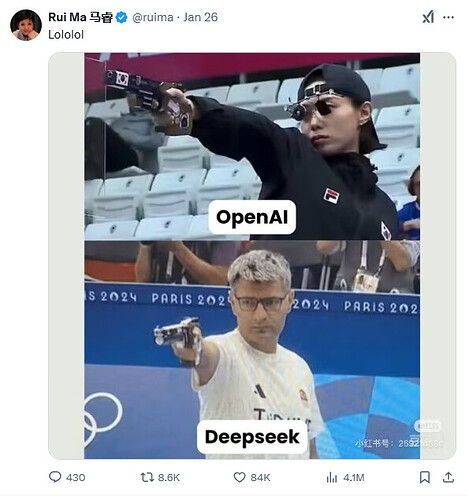Originally published at: https://peakprosperity.com/chinese-firm-disrupts-big-ai-with-deepseek/
There has been something of a massive bubble in AI stocks of late. If you haven’t noticed, then you have been busy doing more productive things with your life than tracking the latest Fed-inspired tech bubble.
What happened? ChatGPT came out not that long ago, took the world by storm, raised $6 billion in capital, hired thousands of very bright people, and set about building larger and larger AI models.
Each new iteration was exponentially larger than the last. The computing power required was exponentially larger. For a variety of complicated reasons, the chipset company Nvdia had a corporate moat built upon its chips combined with its software and superior means of linking thousands of units together into a cohesive whole.
For a truly comprehensive and brilliant deep dive into the entire subject, may I point you to this article?

(Source)
This allowed Nvdia to charge obscene amounts of money for its products, scoring super fat 90% margins (75% overall once their gaming cards had dragged that down). The US decided the best Nvdia chipsets, the H100’s, were too competitively important to allow other countries such as China to buy them and so limited exports.
Enter China. After deciding that financialization wasn’t in its best overall interest (very smart) some of China’s Quant funds opted to deploy their talent elsewhere and one of them put a few of its clever coders to work to develop AI from the bottom up.
Constrained by the H100 limitation, they set about trying other clever approaches. Necessity is indeed the mother of invention, as they proved in startling fashion.

Without going into all the complexities, and they are well beyond my capability to understand, the summary is that they made an AI product that absolutely crushed the competition in terms of performance vs price.
The training for their model cost a reported $5 million, vs $100 million for OpenAI’s ChatGPT versions.
Unlike “Open” AI, the DeepSeek team made their discovery freely available to all by making it open source.
Its model can self-check and self-improve and uses a reported 45 times less computational power to turn in performance results that match all of the very best and largest and most expensive US AI models.

(Source)
This is being downplayed by some who aren’t coping well with the Chinese leapfrogging as “clever, but not really new.” Well, given none of the US, Silicon Valley, super-expensive models do this, I am going with ‘clever and new.”
As if that weren’t bad enough, they just announced the same thing with an image generation AI tool called Janus Pro 7B, besting OpenAI’s DALL-E 3 and Stable Diffusion.

(Source)
The shocks to the system took a while to develop but I guess Wall Street analysts finally had some free time this weekend and stock futures gapped down on Sunday night leading to Monday’s Nasdaq rout.
My best definition of a bubble is that one exists when asset prices rise beyond what incomes can sustain. Nvidia’s more than $3.5 trillion market capitalization rested upon the belief that it had an impenetrable corporate moat. Nobody would be able to beat it, not for a long while, and their practice of pouring earnings back into R&D would keep them safely ahead of the pack.
But then along came the Chinese team and the moat turned into something of a muddy puddle.
Okay, welcome to the turbulent world of technology which is nothing if not a long unbroken tale of disruptors disrupting things.
While this fits that mold, we have to consider the extreme bullishness that had driven Nvidia to a valuation larger than the entire stock market capitalizations of France and Germany combined.
Bigger AI models were going to need more chipsets, and more data centers, and more power. More, more, moar!
Now all of that has suddenly been turned on its head.
Already Microsoft has pulled a $3.3 billion data center.

Power company stocks are getting absolutely smashed.

Grok, the AI at “X,” tells me that the cumulative market cap of the leading AI companies is around $16 trillion. What if that gets cut in half, which would be light for a bursting bubble? That $8 trillion loss would match the total market cap meltdown of the Great Financial Crisis of 2008-2009.
Could another such GFC be brewing here? Yes, and that brings us to Part II, where we need to discuss the features of bursting bubbles and what this means for the incoming administration’s plans, hopes, and dreams.
The short version is, bursting bubbles really suck, especially for the unprepared. If your wealth isn’t adhering to a risk-managed strategy, then I wish you the very best of luck. Bubbles make mince meat out of passive strategies. They always have, and they always will. No, this time will not be different

